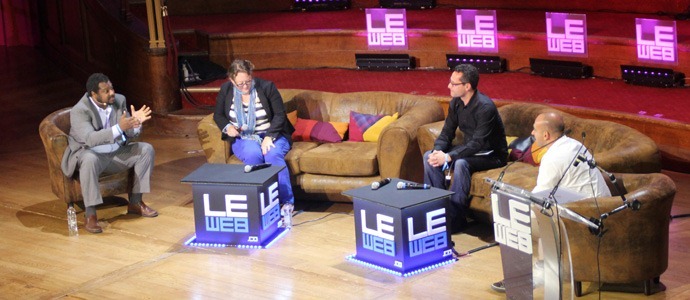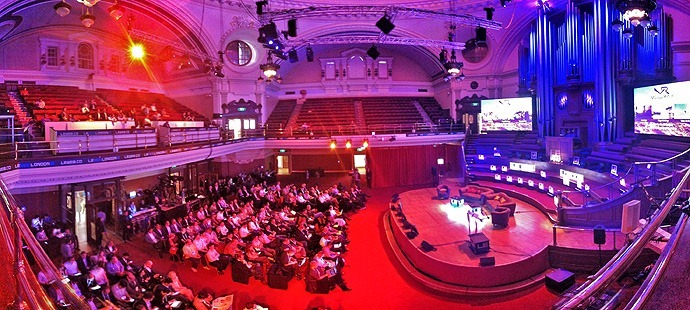
LeWeb London is happening today, in a truly beautiful venue in central London. This is (probably) the first of a series of posts from the event (battery permitting).


The day opened with a hip-hop violinist and an intro from Loic and Geraldine Le Meur. The signature style of LeWeb events is “flexibility” with what seems to be a deliberate attempt to differentiate from more “traditional” industry conferences.
Faster Than Real Time – Or Else
Loic explained the chosen theme of the conference, “Faster Than Real Time”:
“To me, it means that there is data everywhere – everything is gathering data, and it’s being streamed, available for new kinds of applications, that will predict what’s going to happen. It’s about getting revealing hidden information in real time… how many of your friends are here, is there a free hotel nearby, etc.”

The first session of the day was a basically a advert for London as a home for entrepreneurs – and given the traditional English/French rivalry, one of the participants got in a dig against French President Francois Hollande’s economic policies – “we invite all you entrepreneurs fleeing Paris to come to London”.
Next, two partners from McKinsey delivered a presentation on the value of big data for organizations, but suffered some problems. The first was a gap between the contents and the the audience. The LeWeb audience is a tough crowd: an audience that prides itself in being “faster than real time” themselves, in being aware of what has already been swirling around the web. And McKinsey’s use of “consultant-speak” didn’t help (Danvers Bailleu on twitter: “McKinsey are just making up silly words: ‘nowcasting’ – really?”).
Presenters at LeWeb have to bring genuine news or deep personal insight that can’t be found elsewhere. As analyst Tom Rafterty pointed out “For a lot of attendees the main value of going to LeWeb will be the conversations in the corridors”
The second problem wasn’t that the power for the microphones (and online feed) cut out, leaving the presenters trying to shout to make themselves heard.

Next celebrity Chef Jamie Oliver and Instagram CEO Kevin Systrom came on stage. Jamie Oliver was clearly very clued in about social media use. He uses it the same way as most of us – sharing pictures of food, etc. – with the slight difference that his life is a lot more interesting, and he has a lot more followers. He was most at ease when discussing how to use social media to improve food awareness. He using his status to “to ‘stir the pot’ of food corruption,” championing better school dinners and reducing the use of “pink slime” in food.
For me, the real lesson of the session was that Jamie Oliver is a natural communicator, and that is a skill that has served him well, and one that entrepreneurs at the show should try to copy – for example, he completely outshone the Instagram CEO with his more earthy (and quotable) style:
- “The food industry is as corrupt as the arms industry”
- “One of the downsides of Twitter is that it can be very bitchy” (immortalized by @gapingvoid below)

- On businesses using social media “It’s like having empty stage with a drum kit and guitars – businesses need to hire passionate musicians to use the instruments and make great music”
- On how his social use might differ from others: “I went to a fairground and posted a picture of me as a zombie with a gun to my head – and had to delete it it three minutes later.”
- On using social media to make change in the world: “The media can be fantastic if they want to be”
- On the lack of action: “We have loads of measurement about public health problems and we still don’t do anything about it”
The next session was a sales pitch from Bradley Horowitz of Google+: “We discovered that privacy matters, everywhere in the world” The company is working hard to connect social with more of the real world, for example with phones that understand the difference between a call from your wife or a headhunter.
Interestingly, Google pushed the enterprise angle pretty hard, and invited representatives from Kraft on stage to talk about how they are using the platform to engage with their customers. There was also a live demo of Google Hangout..

Other sessions included self-declared “Professional Networker” Robert Scoble interviewing Ben Ling of friend-making tool Badoo and a discussion with Aaron Levie of Box.com.
Random
Paul Clarke on twitter: “It’s more French than I was expecting. Like really, really French.”
Overheard: “I wrote a blog post on bloggers who blog about bloggers who blog – and got lots of hits”
In a PR stunt, VC gets corporate logo shaved into his head. And as usual, nobody quite sure what was supposed to happen next…

Finally: photo caption: “Who says LeWeb is only for Millenials?”

